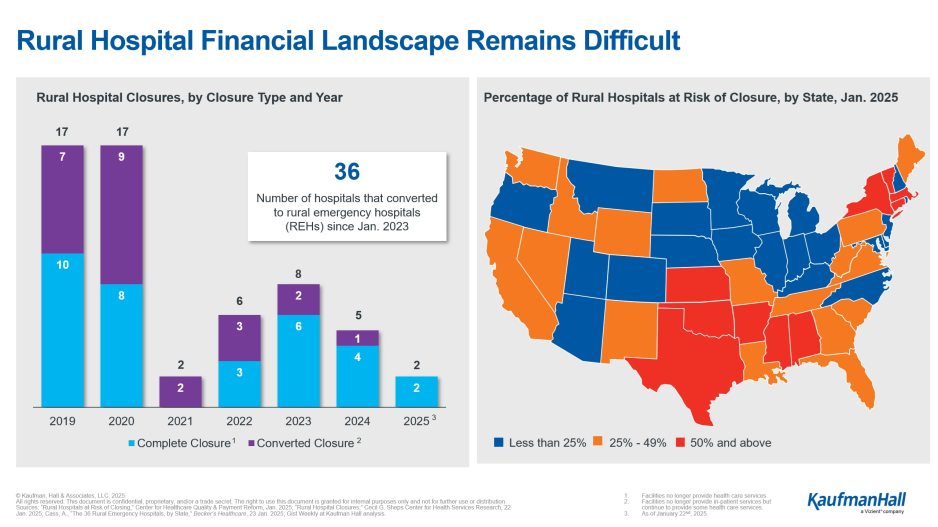Thursday Report

From Washington, DC,
- The Wall Street Journal reports,
- “Senate Republicans moved to take their first step Thursday toward funding new spending on border security and the military, while Democrats prepared to put GOP lawmakers on the record on uncomfortable issues at the start of President Trump’s new term.
- ‘The Senate was set to start a series of votes related to Republicans’ budget blueprint aimed at unlocking $342 billion in spending—and the same amount of offsetting cuts—over four years, which is expected to culminate in the plan’s passage sometime Friday morning.
- “The process of debating and amending the budget resolution was slated to begin late Thursday. A budget resolution—if passed by both chambers—unlocks a process known as budget reconciliation, which allows the Senate to bypass its filibuster rules and pass legislation with a simple majority instead of the 60-vote threshold for most measures. The process would allow Republicans to pass Trump’s fiscal agenda later this year without needing Democratic help. The Senate and House then would have to agree on final legislation.
- “But the reconciliation process also will empower Democrats to propose as many amendments as they want, leading to what is expected to be an all-night “vote-a-rama.” While the amendments are nonbinding, they offer a rare chance for the minority party to force the majority to follow its lead.
- “Democrats are going to hold the floor all day long—and all night long—to expose how Republicans want to cut taxes for billionaires while gutting things Americans care about most: healthcare, jobs, public safety, national security, housing, education,” Senate Minority Leader Chuck Schumer (D., N.Y.) said.”
- Per a Senate news release,
- “Sen. Chuck Grassley (R-Iowa), a senior member and former chairman of the Senate Finance Committee, joined Sen. Amy Klobuchar (D-Minn.) in reintroducing the Safe and Affordable Drugs from Canada Act. The bipartisan bill would allow Americans to safely import prescription drugs from Canada – lowering costs, increasing access and strengthening competition in the pharmaceutical market.
- “Congress must take an all-of-the-above approach to lowering the price of prescription drugs. Our commonsense, bipartisan bill would provide Americans increased access to safe, affordable prescription drugs available in Canada, while boosting much-needed competition in the pharmaceutical industry,” Grassley said.
- “Americans pay the highest prices in the world for prescription drugs,” Klobuchar said. “Our bipartisan legislation would save Americans money by allowing them to import their medications from pharmacies in Canada. Brand-name prescription drugs that we invent here in America cost more than twice as much in the United States as in Canada. Americans deserve better. Building on my legislation to allow Medicare to negotiate lower prescription drug costs, I will continue to work to increase competition in the pharmaceutical market, so Americans no longer get ripped off by Big Pharma.”
- “Find bill text HERE.”
- Fierce Pharma tells us,
- “As the second Trump administration settles in, the U.S.’ top pharmaceutical trade group is drafting its ambitions for the next four years ahead of a planned meeting with the president on Thursday.
- “The sit-down between President Donald Trump and leaders from the Pharmaceutical Research and Manufacturers of America (PhRMA) will provide the trade group’s head, Stephen Ubl, and CEOs from several of the world’s top drugmakers with a potential avenue to sway the commander in chief’s views on policies affecting the industry, Bloomberg reported, citing people close to the matter.
- “In particular, the industry wants to garner support for adjustments to certain drug pricing provisions baked into 2022’s Inflation Reduction Act (IRA), the news service said.” * * *
- “As for what that government-industry collaboration might look like, PhRMA this week released its 2025 policy agenda (PDF), which broadly seeks to promote pro-innovation regulatory and trade positions, challenge features of the IRA price negotiations, curb hospital drug markups and clamp down on pharma middlemen.”
- Yesterday, the Congressional Research Service posted an In Focus paper on U.S. healthcare spending and coverage.
- Tammy Flanagan, writing in Govexec, explains “What happens to my insurance when I leave the federal government?”
- NCQA has opened its HEDIS measures public comment period.
- “NCQA’s public comment period is open and ready for your input.
- “NCQA seeks public feedback on proposed new measures, changes to existing measures and measure retirements, and NCQA acknowledges that the health care policy environment is rapidly evolving at this time. Reviewers are asked to submit comments to NCQA in writing via the Public Comment website by 5:00 p.m. (ET), Thursday, March 13. NCQA will take into account all comments received and the evolving environment as NCQA moves forward to prepare the final versions of these measures.
- “NCQA seeks comments on the following:
- “Three new HEDIS measures.
- “Revising six HEDIS measures.
- “Retiring one HEDIS measure.
- “Cross-cutting item for HEDIS to align with federal standards for race and ethnicity.
- “Three new measures for the Diabetes Recognition Program.” * * *
- The public comment period ends at 5:00 p.m. (ET) on Thursday, March 13. Visit My NCQA to submit comments. For details on proposed changes, visit the NCQA website.
- Per an HHS news release,
- “Today, the U.S. Department of Health and Human Services (HHS) Office for Civil Rights (OCR) took action to support President Trump’s executive orders defending children and restoring biological truth in civil rights and health information privacy enforcement.
- “As directed by President Trump’s Executive Order 14187, “Protecting Children from Chemical and Surgical Mutilation,” HHS OCR rescinded prior Administration guidance entitled “HHS Notice and Guidance on Gender Affirming Care, Civil Rights, and Patient Privacy,” issued March 2, 2022 (“2022 OCR Notice and Guidance”). This rescission supports Administration policy in Executive Order 14187 that HHS will not promote, assist, or support “the so-called ‘transition’ of a child from one sex to another, and it will rigorously enforce all laws that prohibit or limit these destructive and life-altering procedures.” This rescission also aligns with Administration policy in Executive Order 14168, “Defending Women from Gender Ideology Extremism and Restoring Biological Truth to the Federal Government.”
- “Today’s rescission provides important notice to the regulated community that the 2022 OCR Notice and Guidance no longer represents the views or policies of HHS OCR,” said OCR Acting Director Anthony Archeval. “The rescission is a significant step to align civil rights and health information privacy enforcement with a core Administration policy that recognizes that there are only two sexes: male and female.”
- “Under the prior Administration, HHS through OCR provided notice to the public of how OCR intended to interpret civil rights and health information privacy authorities to protect the chemical and surgical mutilation of children, what the prior Administration referred to as “gender-affirming care.” Section 5 of Executive Order 14187 specifically directs HHS to rescind this guidance.
- “OCR’s action is part of a larger initiative to defend women and children and restore biological truth to the federal government.
- “OCR’s rescission of the 2022 OCR Notice and Guidance is available here: https://www.hhs.gov/sites/default/files/ocr-rescission-february-20-2025-notice-guidance.pdf – PDF“
From the judicial front,
- Govexec informs us,
- “A federal judge on Thursday denied the National Treasury Employees Union and other federal employee unions’ request to block the mass firings of their members who are probationary employees, future large-scale layoffs across agencies pursuant to a Trump executive order and any renewal of the “deferred resignation” program for federal employees.
- “U.S. District Judge Christopher R. Cooper, an Obama appointee, said in his preliminary ruling that the unions likely must first bring their claims before the Federal Labor Relations Authority, whose chairwoman Trump recently fired ahead of the expiration of her term.
- “Although district court review may appear more efficient or convenient to NTEU, its preference does not insulate its claims from the [Federal Service Labor-Management Relations Statute] review scheme,” Cooper wrote.”
- FEHBlog note — This is the same legal outcome that occurred in the preliminary injunction challenge to the Fork in the Road program in federal district court in Boston.
- Reuters reports,
- “Regeneron (REGN.O) has won a court ruling that will make it harder for U.S. authorities to win a lawsuit accusing it of paying illegal kickbacks through a charity to promote the use of its expensive eye drug Eylea.
- In a unanimous opinion, on Tuesday, a three-judge panel of the 1st U.S. Circuit Court of Appeals found that the United States must prove that the alleged kickbacks directly caused Medicare, the federal health insurance program for Americans aged 65 and older, to make payments for Eylea that it otherwise would not have made.
- “The government had argued that proving illegal kickbacks alone would be enough.
- “We are pleased with the decision from the appellate court and look forward to presenting our case to a jury,” Regeneron said in a statement.”
From the U.S. public health and medical research front,
- ABC News lets us know,
- “Nature versus nurture: Scientists are gathering more evidence on which has more of an impact on human well-being amid the aging process.
- “While both environmental exposures and genetics are known to play important roles in shaping human aging, living conditions and lifestyle choices impact human health much more than genetics, according to a new study published Wednesday in Nature Medicine.
- “Researchers from Oxford Population Health used data from nearly 500,000 participants in the U.K. to assess the influence of 164 environmental factors and genetic risk scores for 22 age-related diseases and premature death, according to the paper.
- “The data showed that environmental factors accounted for 17% of the variation in risk of death, compared to less than 2% explained by genetic predisposition.
- “Smoking, socioeconomic status, physical activity and living conditions had the most impact on mortality and biological aging, the study found.”
- Per Medscape,
- “A new analysis of long COVID patients has identified five distinct subtypes that researchers say will help doctors diagnose the condition.
- “The new five-type index, developed by federal researchers with the National Institutes of Health’s RECOVER COVID Initiative, identified the most common symptoms in 14,000 people with long COVID, with data from an additional 4000 people added to the updated 2024 index.
- “By using the index, physicians and researchers can better understand the condition, which is difficult to treat and diagnose because no standard definitions or therapies have been developed. Doctors can use the index to offer more targeted care and help patients manage their symptoms more effectively.”
- STAT News relates,
- “Four years after Apple announced a study to explore how its products could be used to support people with asthma, an application developed from that research is now available to the public.
- “Called Asthma Tool, the free software allows users to track their symptoms and triggers and to use wearable devices to monitor vitals, like resting heart rate, for signs that asthma may be acting up.” * * *
- “Asthma Tool is an outgrowth of Apple’s Asthma Digital Study with insurer Anthem (now Elevance Health) and researchers at the University of California Irvine School of Medicine. Apple announced the study alongside two other research projects in 2020, saying it hoped to investigate how the Apple Watch’s new feature for measuring blood oxygen could be used in future health applications. In 2023, the collaborators released preliminary data suggesting that the asthma study helped Medicaid beneficiaries stay out of the emergency department.
- “Despite the promising data, Apple has so far chosen not to release an asthma product on its own. The new Asthma Tool was released by CareEvolution, a clinical trials software company that developed the app used in the asthma study. The product is available as a module through the company’s MyDataHelps platform that lets people collect data for personal tracking and allows them to participate in research. MyDataHelps can be used on the web and or as an app on Apple or Android smartphones.”
- The American Journal of Managed Care points out,
- “The rollout of 2 major interventions to prevent severe respiratory syncytial virus (RSV) in infants—the RSV prefusion F (RSVpreF; ABRYSVO) vaccine for pregnant individuals and the monoclonal antibody nirsevimab (Beyfortus) for newborns—has shown high uptake in a recent cohort study.
- “Conducted at a single academic center, the study found that 64% of eligible pregnant individuals received the RSVpreF vaccine, while 70% of eligible infants received nirsevimab before hospital discharge.
- “This retrospective cohort study is published in JAMA Network Open.“
- Per Health Day,
- “A blood test can help people with irritable bowel syndrome cut out specific trigger foods most likely to worsen their condition, a new study suggests.
- “About 60% of IBS patients who followed a diet guided by the results of the blood test wound up suffering less stomach pain, researchers reported recently in the journal Gastroenterology.
- “By comparison, 42% of IBS patients who didn’t get the blood test experienced a reduction in stomach pain, results show.
- “The test “requires additional validation but could move us one step closer to a ‘precision nutrition’ approach, in which providers can offer personalized dietary recommendations to each patient with IBS,” researcher Dr. William Chey, chief of gastroenterology and hepatology at the University of Michigan, said in a news release.
- “The blood test, called inFoods IBS, tests for the potential of 18 foods to worsen IBS symptoms in specific patients. These include wheat, oat, rye, whole egg, yeast, cow’s milk, black tea, cabbage, corn, grapefruit, honey, lemon and pineapple.
- NBC News reports that “mRNA vaccines show promise in pancreatic cancer in early trial. Personalized mRNA vaccines show promise as pancreatic cancer treatment, a phase 1 clinical trial published Wednesday in Nature found.”
- Per Healio,
- “Patients with COPD had better inhaler adherence when invited to enroll in a program that lowers cost sharing for maintenance inhalers and offers medication management services, according to results published in JAMA Internal Medicine.
- “These findings contribute to the limited evidence of interventions that can improve inhaler adherence in COPD, a disease with high morbidity whose costs are disproportionately incurred by Medicare, and the even more limited evidence addressing cost-related nonadherence, a growing concern given the high prices of inhalers,” Sumit D. Agarwal, MD, MPH, PhD, physician and health economist at Brigham and Women’s Hospital, and colleagues wrote.” * * *
- “To better align insurance coverage with clinical benefit, insurers might consider selectively lowering cost sharing and providing medication management services for clinically effective, high-value services,” Agarwal and colleagues wrote.”
From the U.S. healthcare business front,
- Healthcare Dive relates,
- “Community Health Systems’ losses widened in 2024 to $516 million, up from $133 million in 2023, as the health system struggled with cost pressures, including rising medical specialist fees and payer denials.
- “The system also attributed its losses to divestitures. CHS has been chasing at least $1 billion in profits from hospital sales as it looks to pay down debt, but sales have dinged the provider’s operating income.
- “This year, CHS expects to take in between $12.2 billion and $12.6 billion in revenue, with adjusted earnings before interest, taxes, depreciation and amortization ranging from $1.5 billion to $1.6 billion. The health system could upwardly revise its EBITDA projections if state supplemental payment programs are approved as planned, CHS CFO Kevin Hammons told investors Wednesday morning.”
- Beckers Hospital CFO Report adds,
- “Franklin, Tenn.-based Community Health Systems expects to offload two North Carolina hospitals and two Florida hospitals in the first quarter for about $540 million in gross proceeds, executives said during the company’s fourth-quarter earnings call on Feb. 19.
- “CHS plans to sell ShorePoint Health Port Charlotte (Fla.) and certain assets of ShorePoint Health Punta Gorda to Altamonte Springs, Fla.-based AdventHealth for $265 million in cash. The deal is expected to close in the first quarter, subject to regulatory approvals and closing conditions.
- “The for-profit system also plans to sell Lake Norman Regional Medical Center in Mooresville, N.C., to Duke University Health System. Durham, N.C.-based Duke aims to purchase the 123-bed hospital and its related assets for about $280 million.”
- Modern Healthcare reports,
- “CVS Health’s MinuteClinic is collaborating with Emory Healthcare Network to extend primary care services to more patients in Georgia.
- “With the new partnership, MinuteClinic now offers in-network primary care services at all 35 clinics in the state to most payers through Emory’s integrated network. Patients also have access to Emory’s network of acute care, specialty care, labs, radiology and diagnostic services, according to a Thursday news release.
- “A CVS spokesperson said the Emory collaboration marks the first time MinuteClinic has expanded into primary care services in partnership with a health system. The 35 locations are co-branded.”
- Per a Talkspace news release,
- “We closed out 2024 with a strong fourth quarter, delivering revenue and adjusted EBITDA growth as expected. We continued to broaden our reach, drive awareness and adoption, enhance the provider and member experience, and deliver high-quality care. I’m proud of all that Talkspace has accomplished this year to build a sustainable, profitable business,” said Dr. Jon Cohen, CEO of Talkspace.
- “Dr. Cohen continued, “Over the last three years, we’ve undergone a significant strategic shift, focusing on the payor market and growing our total covered lives to nearly 200 million. We’ve leveraged our well-known brand to drive awareness of Talkspace as an affordable way to access care for not just commercially insured adults, but also teens, seniors, and active members of the military. Talkspace has established a clear competitive advantage in the marketplace with the comprehensive nature of our solution, and we remain dedicated to meeting the escalating demand for accessible, high-quality behavioral health services in the U.S.”
- From a Him and Hers news release,
- “Hims & Hers today announced its plans to introduce at-home lab testing through its platform. The new capability will empower customers to take control of their health with deeper insights and enable providers to access a breadth of data and biomarkers that can help identify risk of disease before it develops, for more precise clinical decision-making.
- “The company has acquired an at-home lab testing facility, Sigmund NJ LLC marketed as Trybe Labs, which will allow Hims & Hers to support at-home blood draws and more comprehensive whole-body testing. The acquisition will broaden the company’s ability to offer a wide range of personalized treatments, supplements and medications and accelerate the expansion into new high-impact clinical categories including low testosterone, perimenopausal and menopausal support.”








